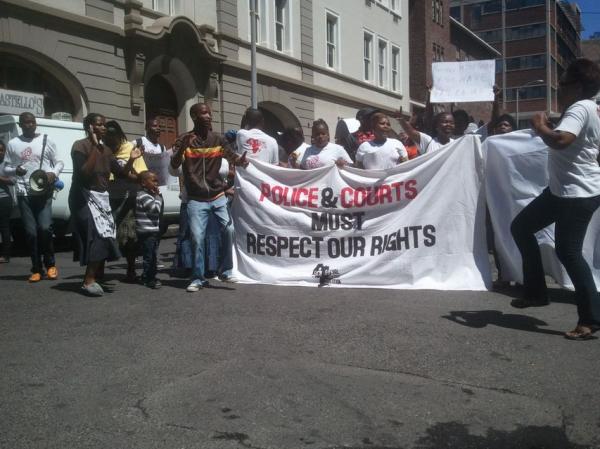

SJC members at the “People’s Commission of Inquiry” on Monday. Photo by GroundUp.
14 November 2012
In December 2009 Thandokazi Njamela was smacked on the head with an unopened beer bottle by her friend’s boyfriend. She lost consciousness and was taken to Khayelitsha’s Site B Hospital.
The next day Njamela, now recovered, lodged a complaint at the Site B Police Station. The police drove around with Njamela looking for the accused, but couldn’t find him. Njamela then saw him a few days later at a tavern in Khayelitsha’s M Section. She contacted the Site B police and they came and arrested him. Njamela then identified him in a parade. She had known him a long time. Up till then the police had acted competently, but that was about to change.
The accused was released on bail but did not turn up to court. A warrant of arrest was issued for him. The prosecutor also informed the court that the accused had a murder case pending against him. Njamela did not hear from the police or the courts again. Instead she heard rumours that the accused had threatened to “deal” with her. He was living near her, so she moved for her safety.
In 2010, the accused was arrested for the double-murder of his girlfriend’s siblings, a brother and sister. Early in 2011, Njamela saw him in the community again, apparently out on bail. This as far as Njamela understands, remains the story until today.
Njamela told her story to a “People’s Commission of Inquiry” set up by the Social Justice Coalition (SJC) outside the Cape High Court on Monday. This followed the delay of the official Commission of Inquiry established by Premier Helen Zille. The premier’s Commission of Inquiry was established following demands in 2011 by several civil society organisations including the SJC. It has been delayed because the Minister of Police, Nathi Mthethwa has filed papers with the Cape High Court trying to interdict it from proceeding. The interdict hearing will be held in December and so the official Commission is on hold until at least then. Monday was supposed to be the first day the official Commission, which is being chaired by former Constitutional Court judge Kate O’Regan and former head of the National Prosecuting Authority Vusi Pikoli, would hear testimonies. The “People’s Commission” was set up by the SJC to show their dissatisfaction at official commission being delayed.
Njamela’s complaint about the police is actually given credence in Minister Mthethwa’s court papers. Included in his court papers is a report of an internal police investigation conducted into the Khayelitsha police. This too was in response to the complaints of the SJC and other civil society organisations. It is marked “confidential” in the court papers, but since it is part of the court record, it is now in the public domain. Its damning contents have been reported in the City Press and other media since Sunday.
The report considers many complaints against the Khayelitsha police including Njamela’s. It states:
The complainant, Thandokazi Njamela alleged that on 20 December 2009 she was assaulted a friend of her boyfried [sic - it was actually the boyfriend of a friend - editor]. A warrant of arrest was issued and later cancelled. The case was also withdrawn after Lieutenant Galant made a statement where the Senior Public Prosecutor was requested to withdraw the case for unknown reasons. The complainant was contacted and she indicated that she knows that a warrant of arrest was issued for the accused. She did not receive any further progress on the investigation. The case docket was handed over to the Detective Commander, Colonel Marais, to be reopened for further investigation.